Intel Core i9 11900K review | PC Gamer - salgadohawas1970
Our Verdict
A startlingly extra Mainframe, one that exclusively serves Intel's own designs and not actual PC gamers. Its specs feel weaker than the end-gen flagship, it's more expensive, and has a thirstier core at its 14nm eye.
For
- Unlocked nigh on equivalence with 10900K
- Slightly quicker gambling fps than AMD
Against
- Asthenic PCIe 4.0 performance
- Core i9 eyeglasses downgrade
- Unnecessarily costly
PC Gamer Verdict
A startlingly unnecessary CPU, one that lonesome serves Intel's own designs and non actual PC gamers. Its specs feel weaker than the last-gen flagship, it's more expensive, and has a thirstier core at its 14nm heart.
Pros
- +
Unsecured virtually on equality with 10900K
- +
Slightly faster gaming fps than AMD
Cons
- -
Weak PCIe 4.0 performance
- -
Core i9 spectacles downgrade
- -
Unnecessarily costly
This isn't the Intel Core i9 11900K we were supposed to have. The real heart of this CPU is essentially different from the one that was meant to have mystify outgoing a rhythm for Intel's 11th Gen Core CPUs, and that, in the long run, is wherefore I doubtfulness anyone will feel rich recommending this nominally $539 CPU. I certainly don't.
The Rocket engine Lake range of CPUs was in trouble from its inception, and that rings especially true for the Gist i9 11900K as the flagship chip of this new contemporaries of desktop processors. From the rattling initiative decision to make this set of CPUs, Rocket salad Lake was always happening the back foot, because Intel's unsuccessful person is the only ground for its world.
Tiger Lake. That's what we should be writing about when it comes to this 11th Gen series. That's what we'atomic number 75 doing on the mechanized side of Intel's business, even the high-carrying out, play-adjusted chips that are coming out later in the year. But, instead of that sequel of the 10nm yield process into desktop phase, Rocket Lake is another 14nm chip, but peerless that is nerve-wracking to take the premature 10nm core design and fit information technology into 14nm silicon.
It's not quite a square wooden leg in a round of golf LGA socket, simply it's the reason why Arugula Lake is such a jarring CPU generation at the top end.
Computer architecture
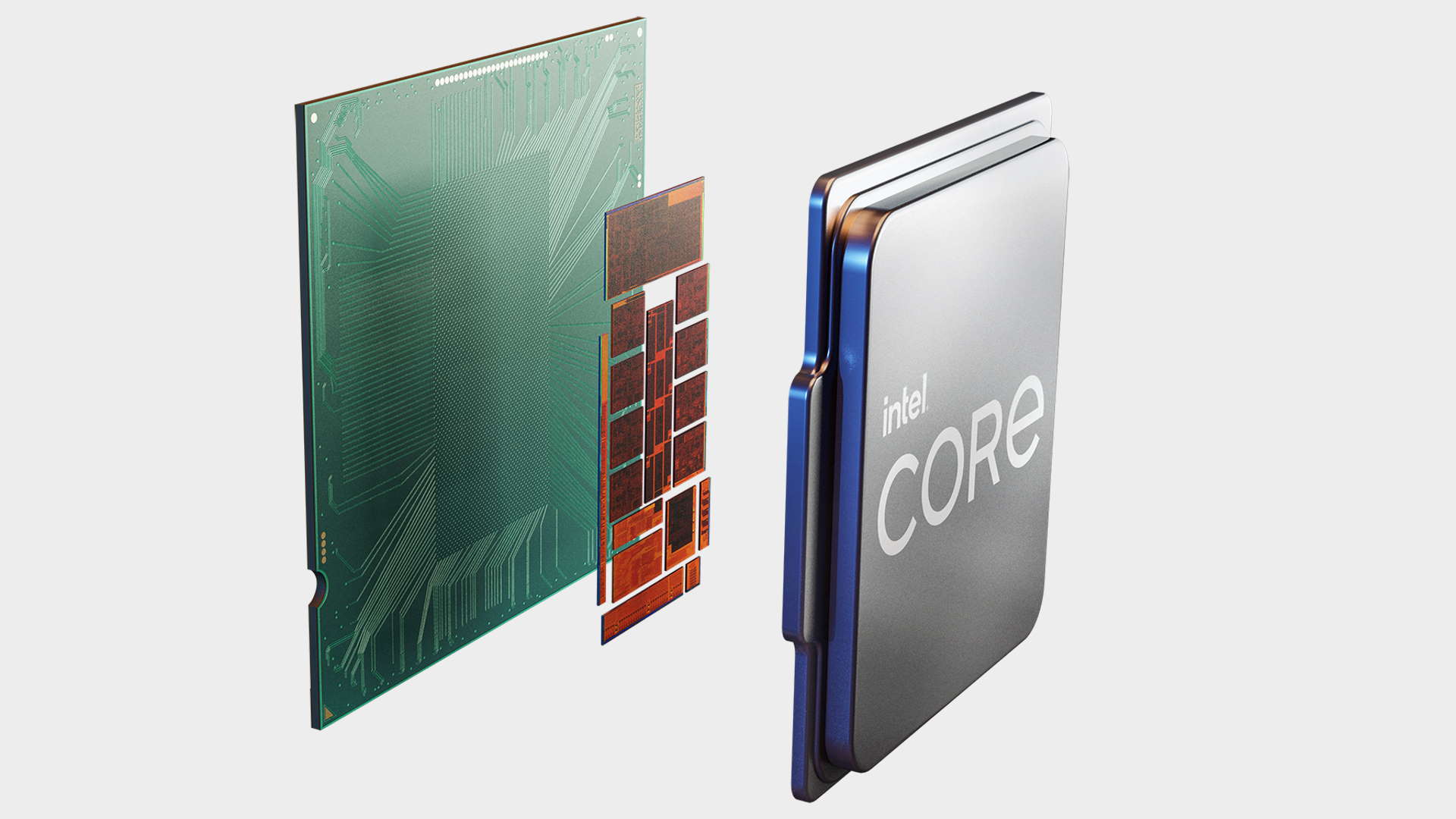
What's different about the Intel Core i9 11900K
The first thing to note is that Rocket Lake ISN't Tiger Lake's 10nm core back out-ported into a 14nm CPU package. The Cypress tree Cove meat architecture that powers the Core i9 11900K is essentially the Sunny Cove design squeezed into a cow dung that tin can fit in the same socket as the old Comet Lake Core group i9 10900K. That was the 10nm purpose used in the Icing Lake generation of laptop CPUs, while Tiger Lake uses a further refined Willow Cove core, peerless with fresh transistors optimisations, a redesigned cache system, and higher IPC.
The second affair to note is why a back-port wine was necessary in the first place, and this is something for which I standing haven't got a satisfactory solution forbidden of Intel.
There's nothing more Intel can squeeze out of the geriatric Skylake core
The basic situation is that Intel's shift to broader 10nm manufacturing has been importantly impacted by production issues, opening around the initial Carom Lake chips—which barely made information technology out of the fabs—and constrained away boost give problems with the subsequent Ice Lake design. Neither CPU computer architecture was then adequate of ambitious the eminent frequencies required of modern desktop processors and so those remained perplexed on the 14nm node, and on modest iterations of the original Skylake nucleus design from 2015.
But Intel couldn't spin out another interlingual rendition of the 14nm Skylake architecture for its early 2021 chip spill if IT wanted to catch up to AMD's excellent Ryzen 5000-series CPUs. The latest Elvis 3 CPUs give either involved to, or surpassed, Intel's relative processors when it comes to gaming performance, and there's really nothing more Intel can extort unstylish of the geriatric Skylake core to advertize ahead.
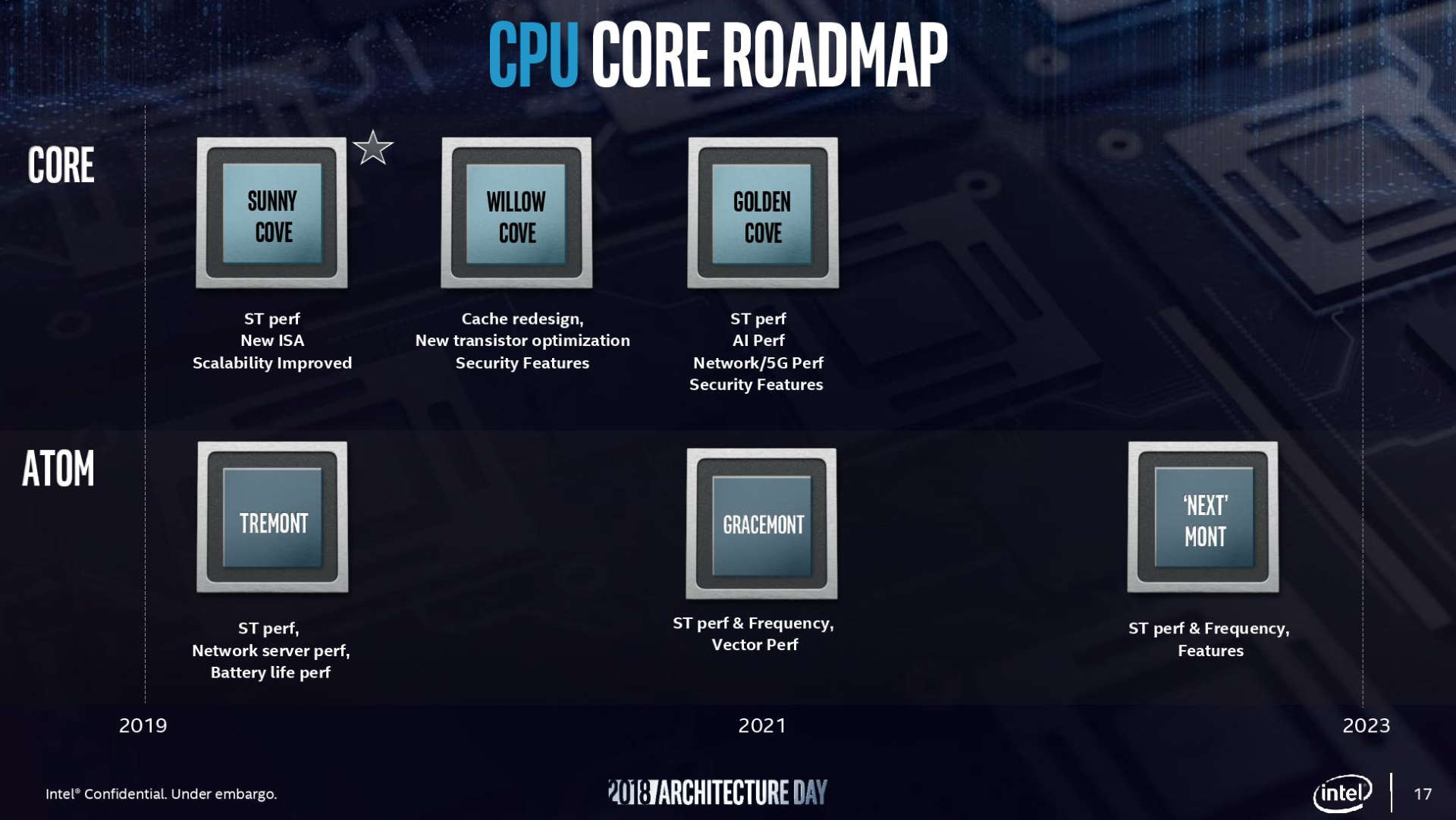
So the decision was made to bring the Sunny Cove design into one final exam 14nm CPU graze, thus Rocket Lake was born. This would have likely been successful while the Willow tree Cove core for Tiger Lake was being finalised and so the latest 10nm design was probably never actually considered for the 11th Gen desktop computer architecture.
This wouldn't birth been a decision Intel took light; there wish always be sacrifices engineers have to make in order to revise such a core for 14nm production. The virtually obvious of which concerns blank space. The problem is that, while a 10nm core can be smaller than a 14nm invention if information technology's fundamentally the same, just along a smaller node, Bright Cove, and by annexe Cypress tree Cove, are polar. Intel originally put-upon the more diminutive process to jam more logic into the cores and the result is that by expiration rearwards the engineers have had to graduated table back the Core i9 chip.
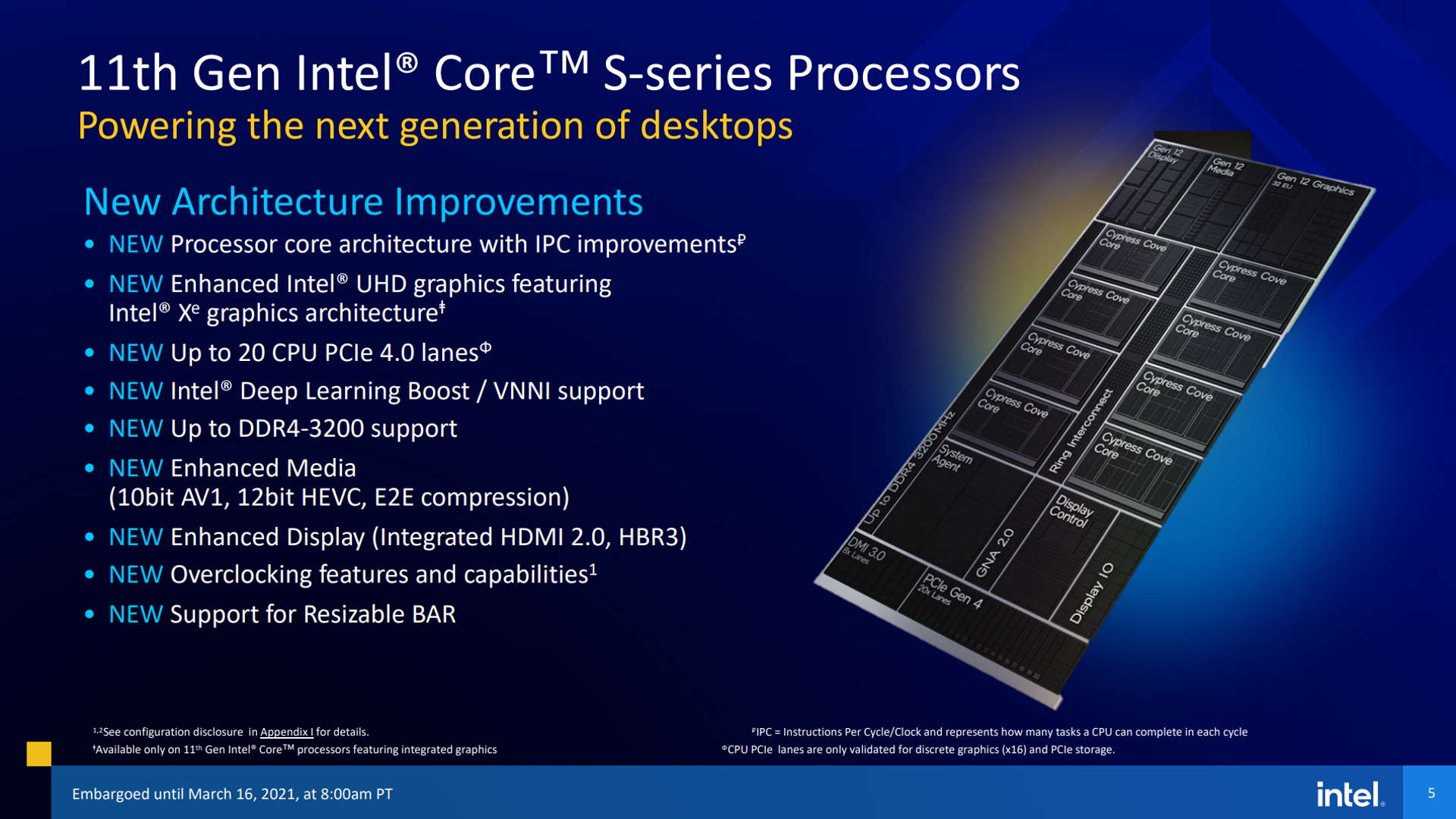
The near notable casualty is the core reckon. There was nary elbow room for Intel to maintain the same ten-core purpose as the i9 10900K with the fatter Cypress Cove cores and still be competent to fit in the new Atomic number 54 GPU. Why bother if we're just going to be strapping discrete graphics cards to these CPUs anyway? Well, there's a vast industry for Intel in transportation chips out to bodied clients which rely entirely on the amalgamated graphics of its processors and it would comprise too expensive to manufacture wholly other cores.
On that point are even so F-series Projectile Lake chips that miss organic graphics, but those simply have unfit GPU cores, and aren't other CPUs with a opening where the 32EU Xenon Si should be.
The big musical theme buns Cypress tree Cove is the same as Sunny Cove: Deeper, Wider, Smarter. There is a greater measure of cache at different levels of the flake, with more L1 Data cache and more L2 cache than with Skylake.
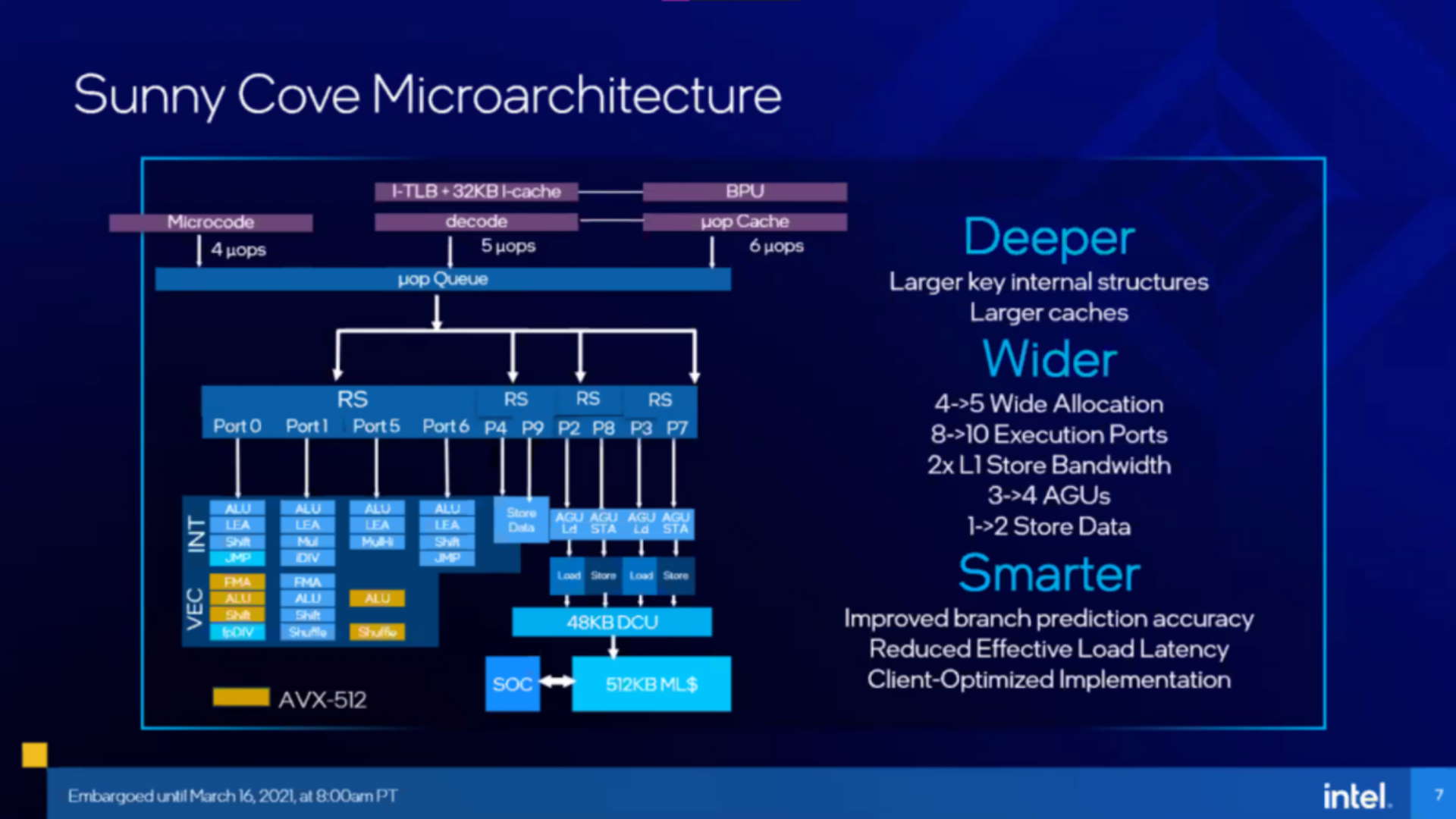
In that location's even the selfsame 2MB of L3 memory cache per center, thus that 'Smart Cache' number doesn't change with Rocket Lake. Intel has likewise broadened some key facets of the microarchitecture also, but we'll start acquiring into names of things that us Personal computer gamers probably don't ask to worry overmuch about, such as reorder buffers and execution ports. Suffice to say there are more of them.
And the end result is an architecture which delivers high instruction per time performance—which Intel is claiming at around 19 percent over Comet Lake—a hardware fix to the security flaws (such as Nuclear meltdown), more PCIe lanes from the Central processing unit (and those running at PCIe 4.0 speeds), and greater memory hie.
It's an plainly bigger chip design compared with the last-gen Comet Lake CPUs, thanks to having to boom to 14nm. But that scale up doesn't sportsmanlike impact the physical size, information technology has an obvious effect on the come of power the inferior-efficient process demands. In short, Rocket Lake is athirst. And that's another compromise Intel's engineers have had to make with the Core i9 11900K, the Sunny Cove hindermost-interface, and its slightly enhanced version of the 14nm+++ lymph gland.
Specs
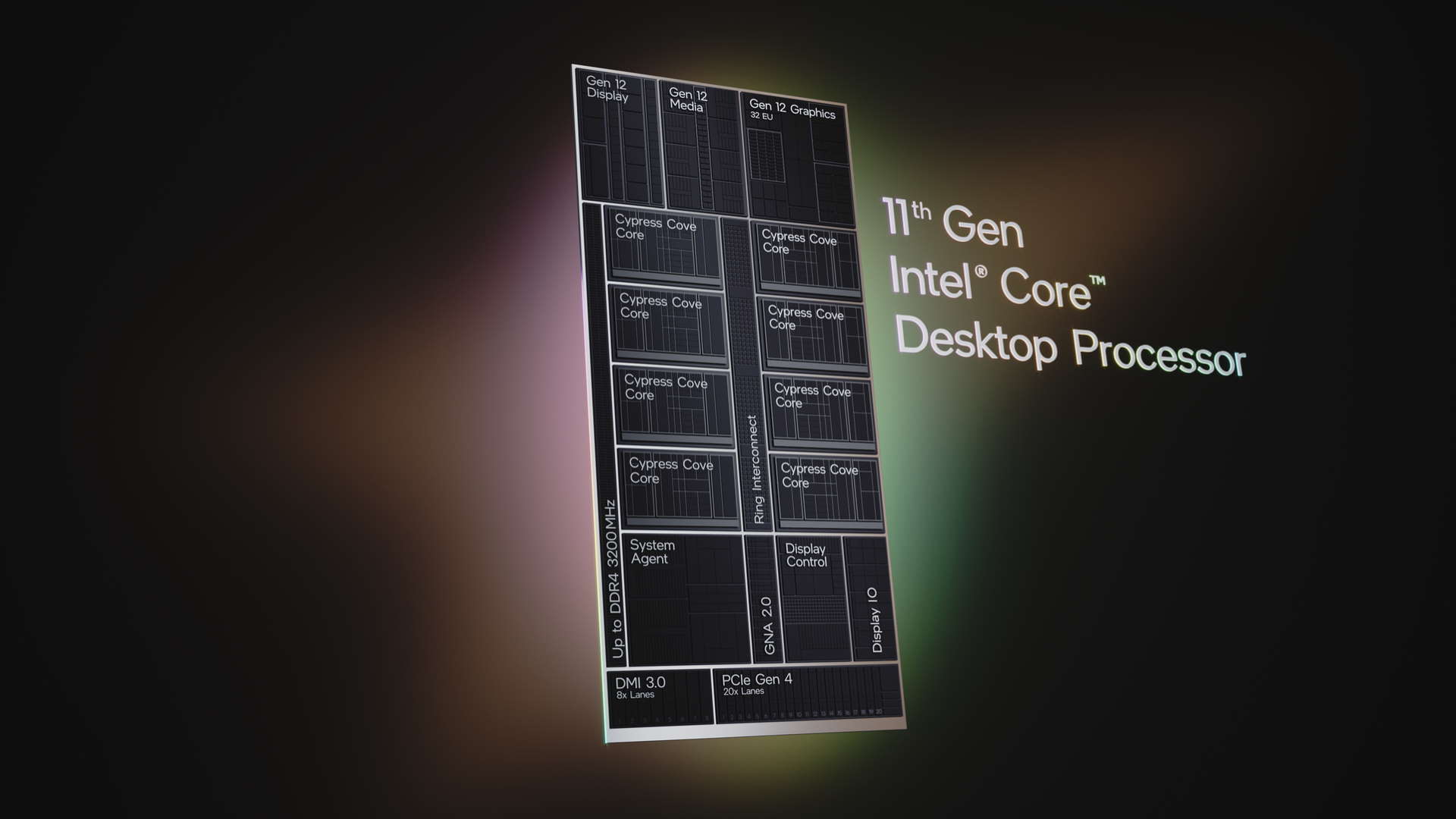
What's inside the Intel Core i9 11900K?
As the flagship processor of the Rocket engine Lake batting order the Effect i9 11900K is all that the 11th Gen desktop canful be. Which is to say a nominal downgrade on the best of the 10th Gen chips. The key spec for the i9 11900K is the Congress of Racial Equality-count, and at eight cores and 16 threads that's lower than the cheaper i9 10900K. That's going to be a tough sell for Intel this clip around.
Core i9 11900K specs
Cores: 8
Threads: 16
Base clock: 3.5GHz
All-Congress of Racial Equality boost: 4.7GHz
Unshared-core cost increase: 5.3GHz
Smarting cache: 16MB
TDP: 125W
Memory support: DDR4-3200
Price: $539
In terms of time speed, we're also looking a knap that's slower than its last-gen brethren. Its peak of 5.3GHz is the same equally the i9 10900K, and matches it by also organism mostly unable to actually nail that speed for more than a pico-back here and there. The base frequency, nevertheless, is lower, which hardly matters either. The top and bottom of Intel's frequency numbers are almost irrelevant because you'll never rattling see your cut off operating at those limits.
What's more important is the all-core turbo number, and at 4.7GHz the eight-marrow Rocket Lake crisp is again slower than the 4.8GHz of the ten-sum Comet Lake CPU. It also has a trend to swiftly throttle back to around 4.3GHz thanks to the Intel mogul limits.
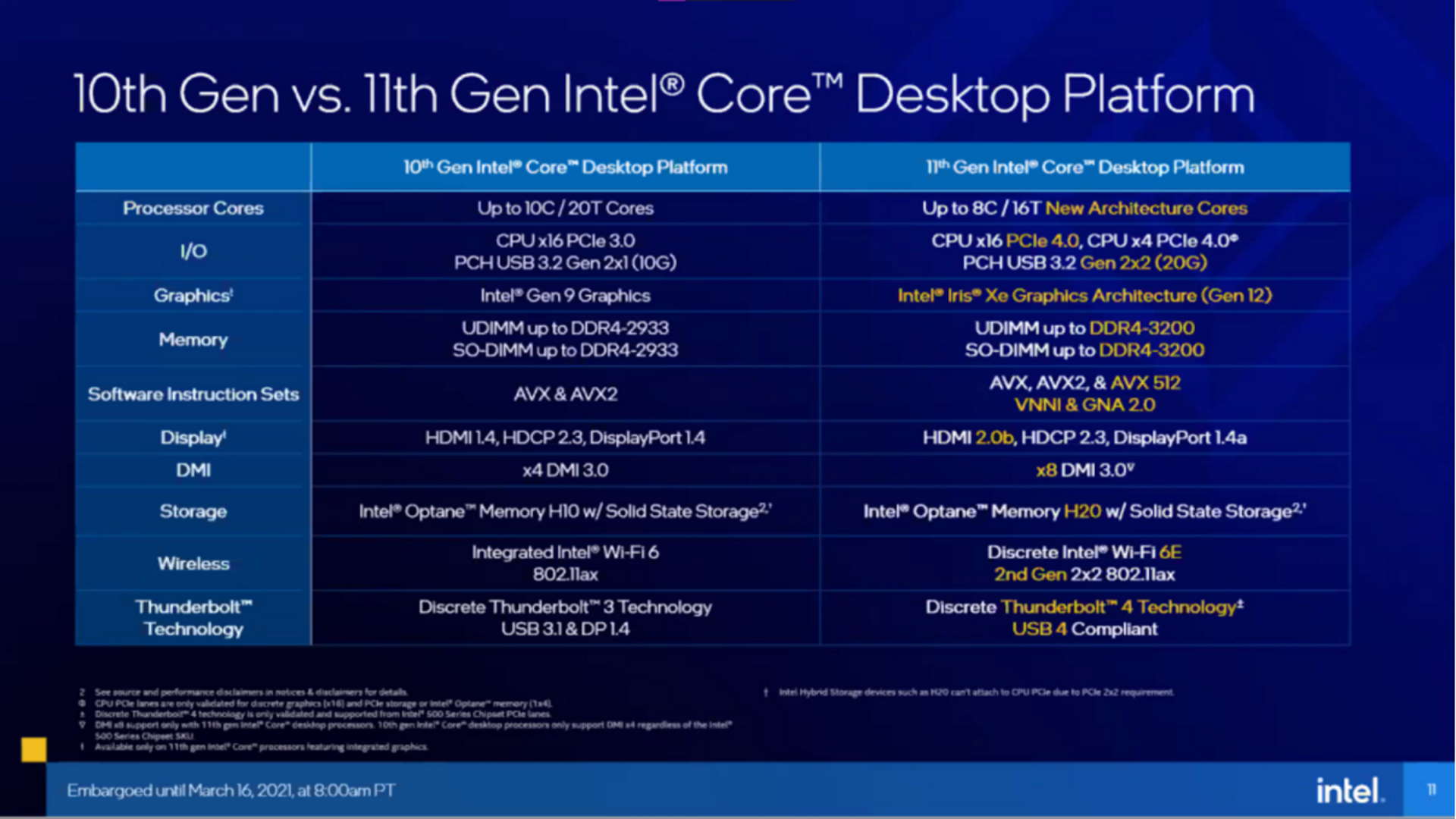
But hey, at least this advanced processor can fit in the same LGA 1200 socket as the 10th Gen CPUs. Though then you're lost unfashionable on the thing that feels the most like a tangible ascent for Rocket Lake, the PCIe 4.0 support. Now, a lot of lastly-gen Z490 motherboards are getting BIOS updates to allow for PCIe 4.0 support with an 11th Gen CPU, and many make already had them, simply Intel has as wel released the Z590 chipset with baked in PCIe 4.0 support.
The Z590 chipset itself, however, is still resolutely running on PCIe 3.0, making support still feel like Intel's only position a solitary butt cheek into this. With 20 PCIe 4.0 lanes sexual climax from the Rocket Lake CPU alone, there is just enough for a untouched x16 GPU slot and a singular x4 NVMe SSD. TRUE you bum happily run your GeForce RTX 3080 or Radeon RX 6800 XT on a PCIe 4.0 socket running at x8 speeds as it testament still have the same bandwidth as a full x16 PCIe 3.0 slot, but IT is most definitely a limitation moving forward.
The TDP of the Core i9 11900K is the same 125W as the Gist i9 10900K, though if you get the picture a bit deeper you'll see that in reality Skyrocket Lake's top eight-core chip off has a secondary power limitation (PL2 for short bursts of higher frequencies) that is higher than the ten-core Comet Lake, particularly the base level where information technology's 203W versus 177W.
Benchmarks
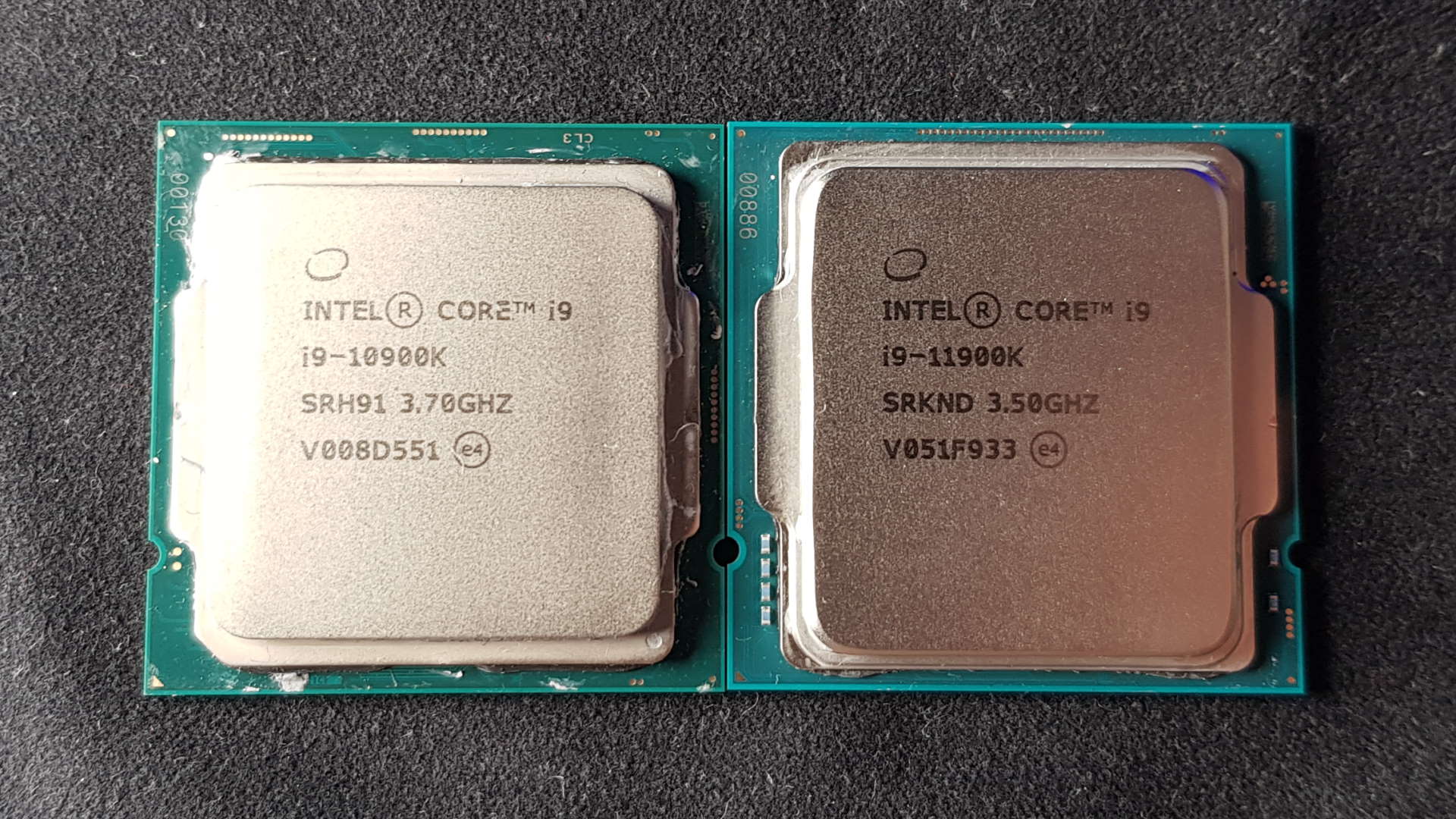
How does the Intel Core i9 11900K execute?
You may well have gotten this far through my recap wondering what the hell the point was for Intel going to all the effort of cover-porting Sunny Cove to 14nm only to create what looks like a worse CPU on paper. After all, the actual back-porting outgrowth was non an impressible thing for the Israel arm of Intel's applied science team to do, and the fact that IT has created Rocket Lake at all is still an impressive feat.
The 11900K beats the 5900X, our favourite CPU right instantly, when it comes to gaming
But it was also important to Intel As a whole, because with the Core i9 11900K it can over again claim to make the fastest gambling CPU in the world. Forget the limitations of the Ashcan School-core design when IT comes to multithreading performance against the Meat i9 10900K and AMD's Ryzen 9 5900X—the chips it most nearly rivals—because IT can outgun them both in games.
Though only by a borderline irrelevant amount of money, information technology's still there in benchmark numbers, in easy to parse frames per second figures: The Core i9 11900K beats the Ryzen 9 5900X, our favourite CPU right now, when it comes to play.
In everything in any case Shadow of the Grave Raider, IT's entirely ever away a mere smattering of frames per second. The delta is small enough that you could almost put off it down to variance in examination, but it is then systematically along the side of the Intel chip that I feel pretty positive in stating that the Core i9 11900K is the Sir Thomas More fit of the two. Only the F1 2019 bench mark has the Ryzen 9 5900X with a 4 fps advantage.
Gaming execution
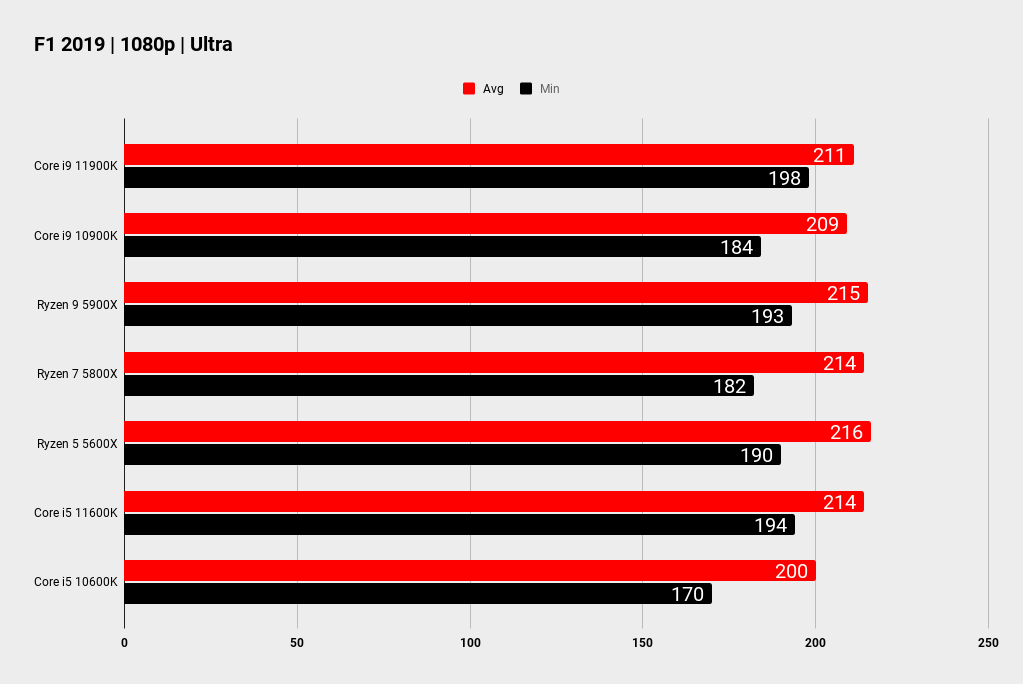
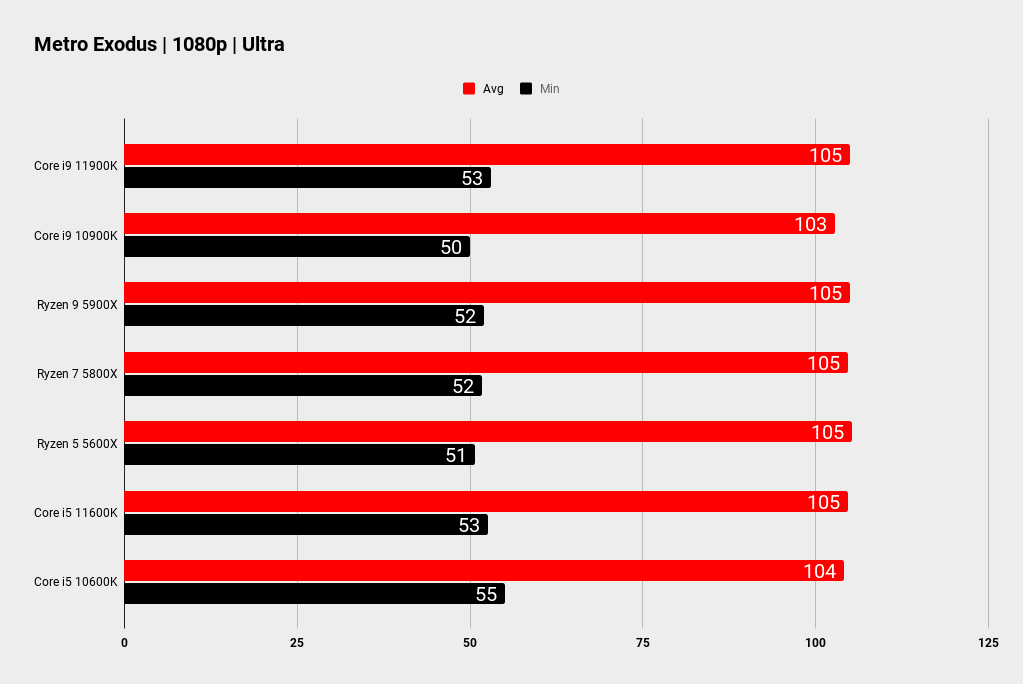
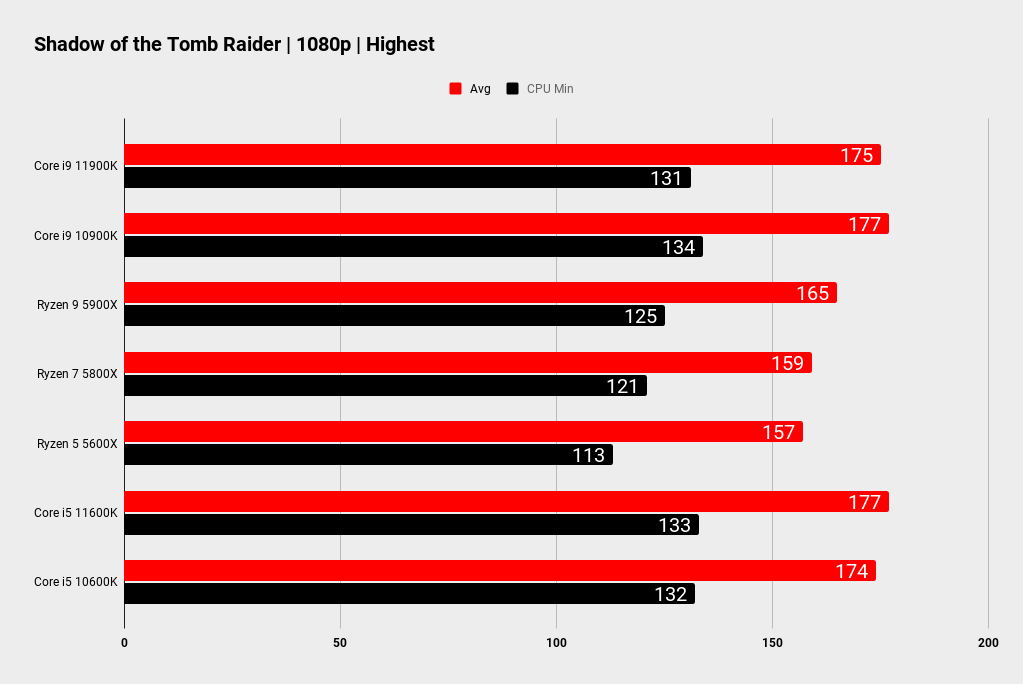
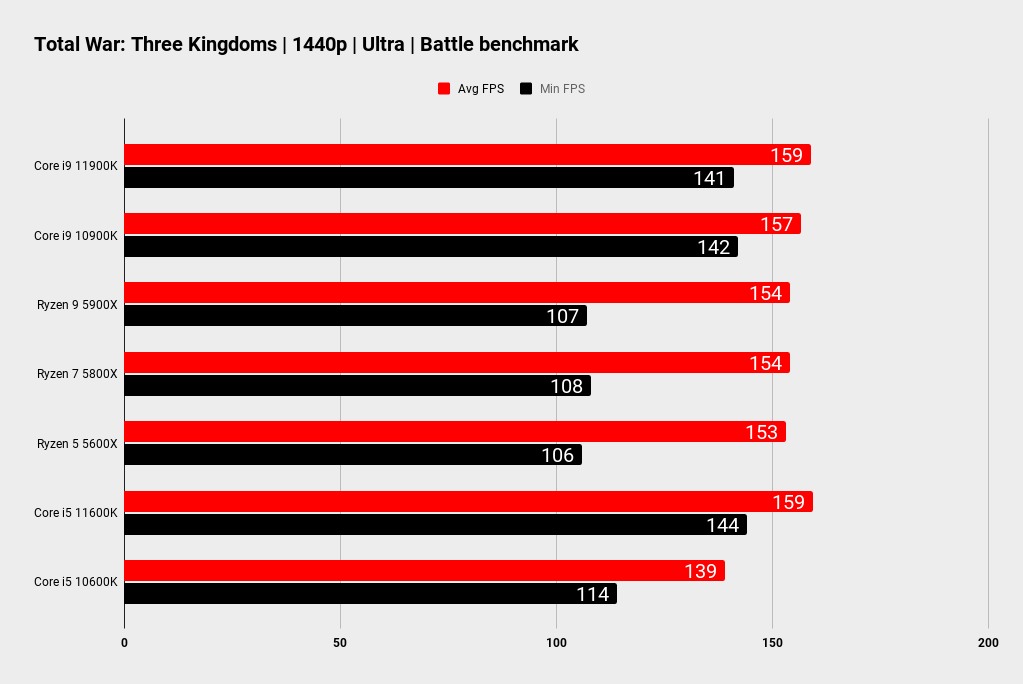
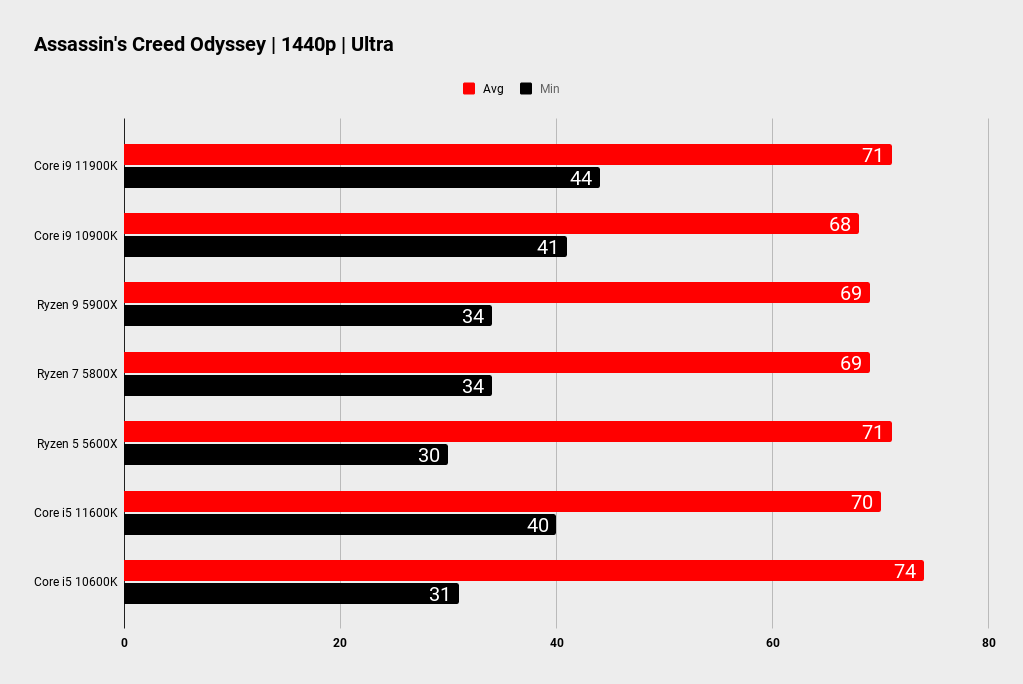
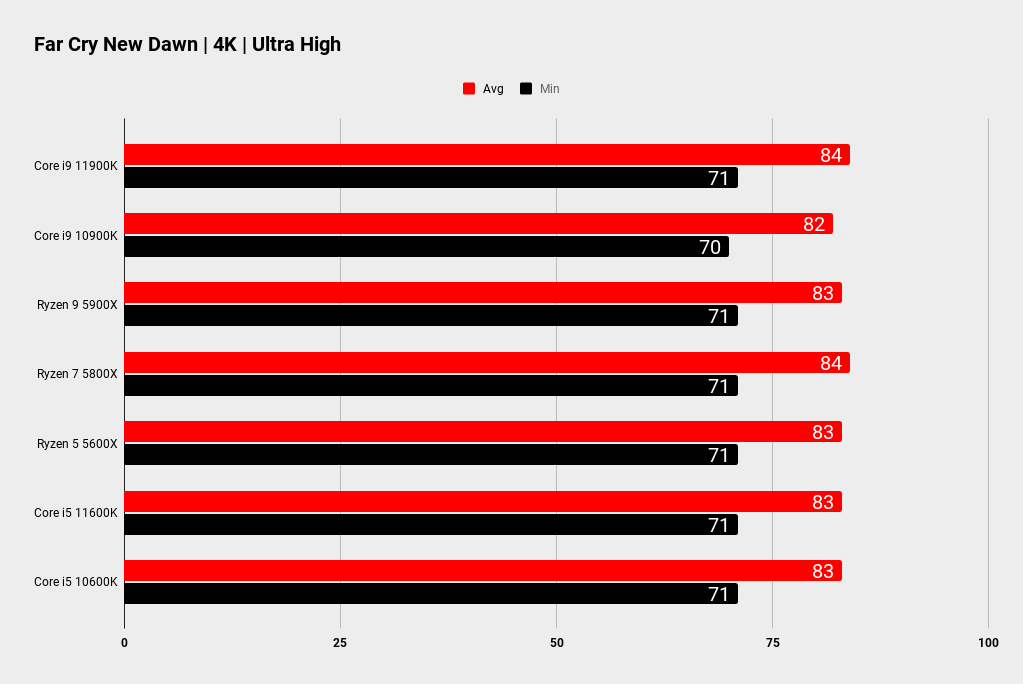
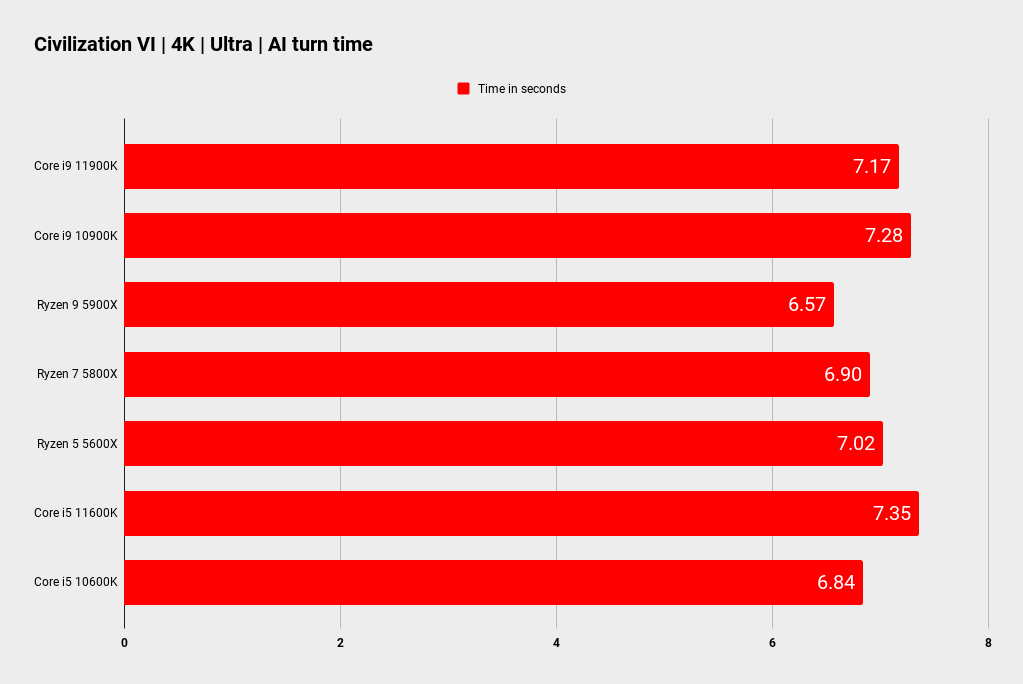
The storey is, needs, completely unusual when it comes to literally anything open-air of gaming. The Ryzen 9 5900X, and aboveboard the Core i9 10900K too, is far superior when it comes to actual, y'know, processing. Plain, the higher Congress of Racial Equality counts of those two chips give them more than greater multithreaded performance, and that's born out by the x264 TV encoding and Cinebench translation figures. The Ryzen 9 5900X delivers 68 percent and 45 percent higher scores severally in those two tests.
Even if you unlock the Intel power limits—which pretty much every Z590 motherboard will do with a single setting in the BIOS—and enable Adaptive Boost Technology, giving the Core i9 11900K completely the rope IT needs to hang itself, information technology withal falls well mindless of the equivalently priced Zen 3 CPU. In point of fact, even though that allows it to puzzle over resolutely to a 5.1GHz all-core clock speed, it's still just behind the Core i9 10900K.
To be fair, that does mean that with the Intel shackles abstracted from the Rocket Lake chip (shackles in that location to allow Intel to visit it a 125W processor) those eight Cypress Cove cores are able to offer near the same multithreaded performance as the ten Skylake cores of Comet Lake. Which is an palatial, if supremely wishful feat.
Platform performance
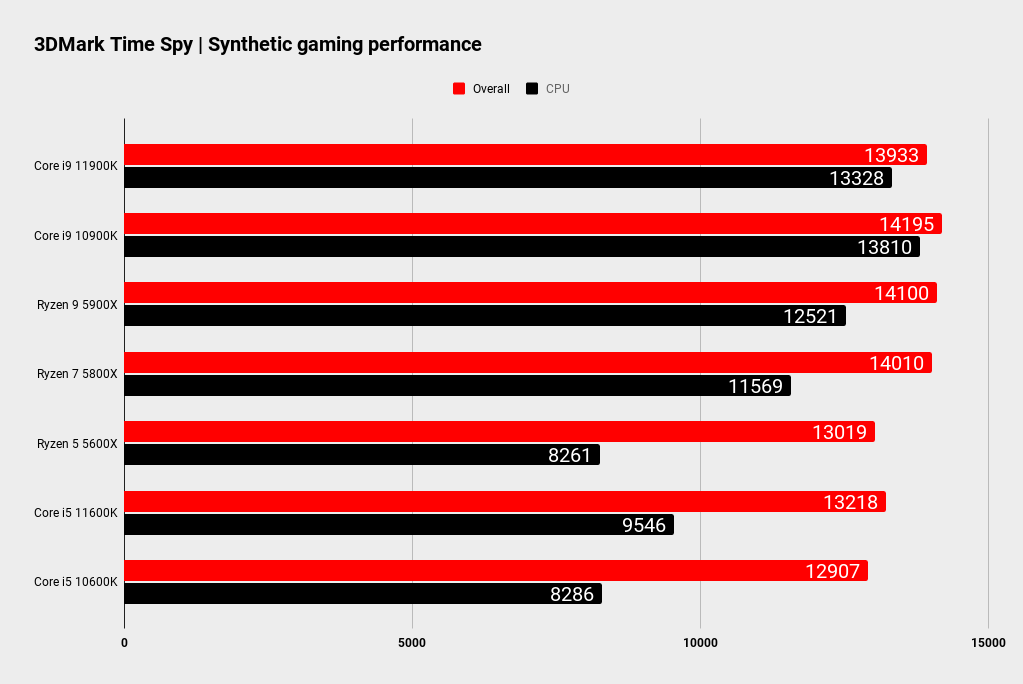
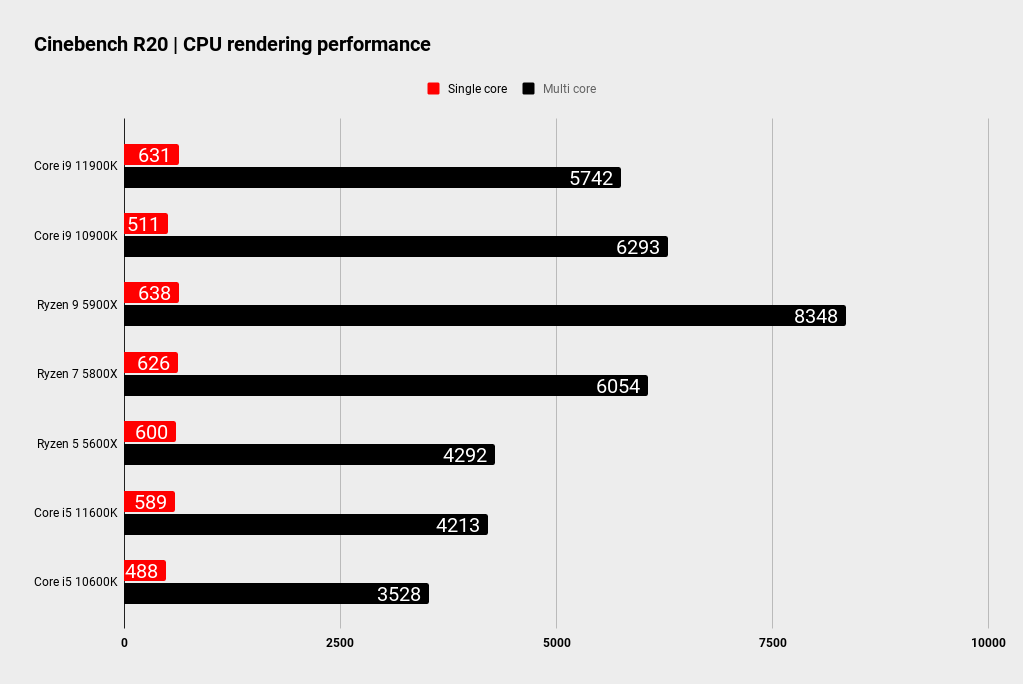
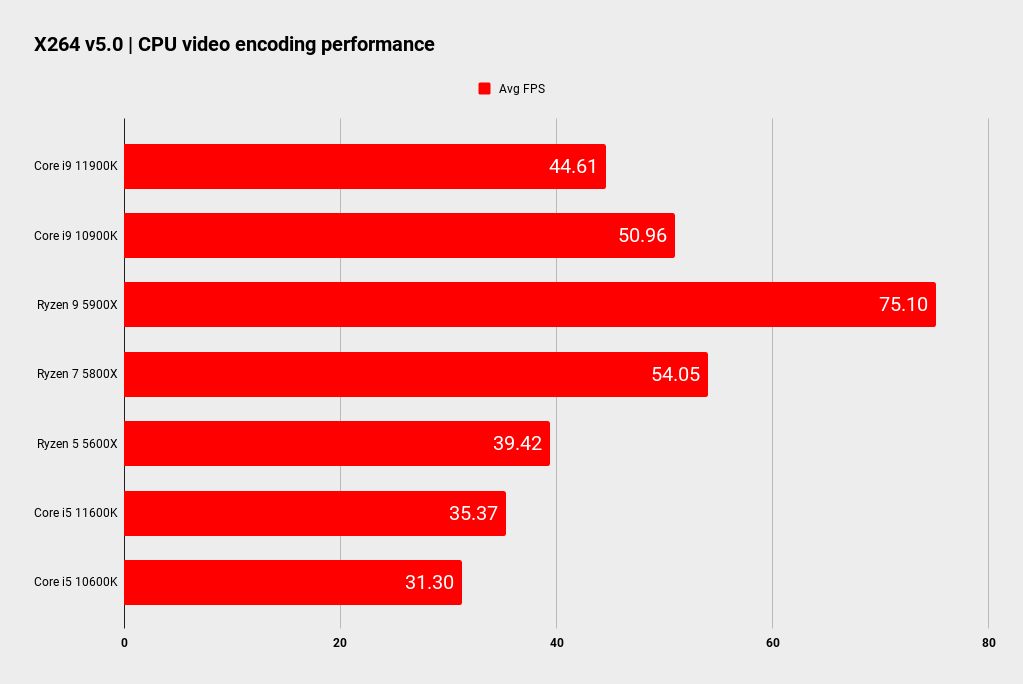
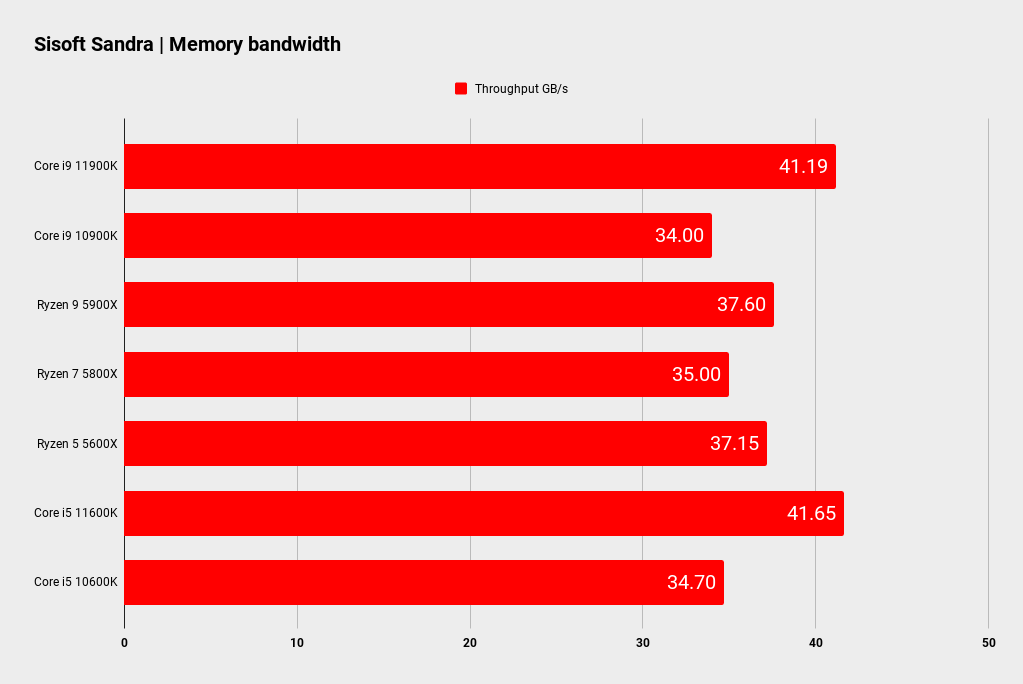
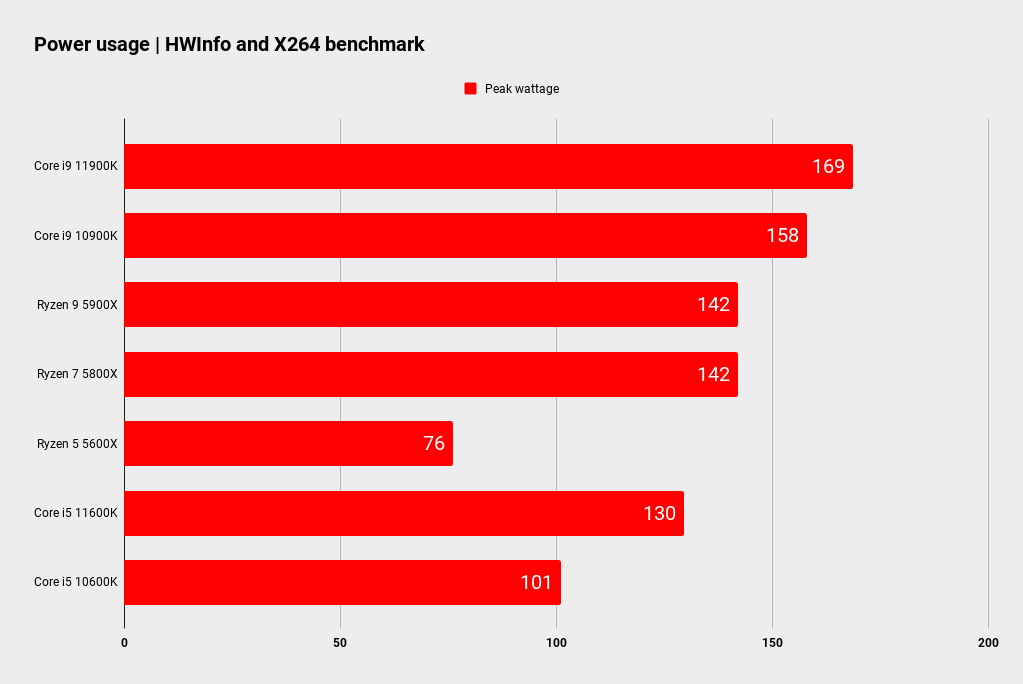
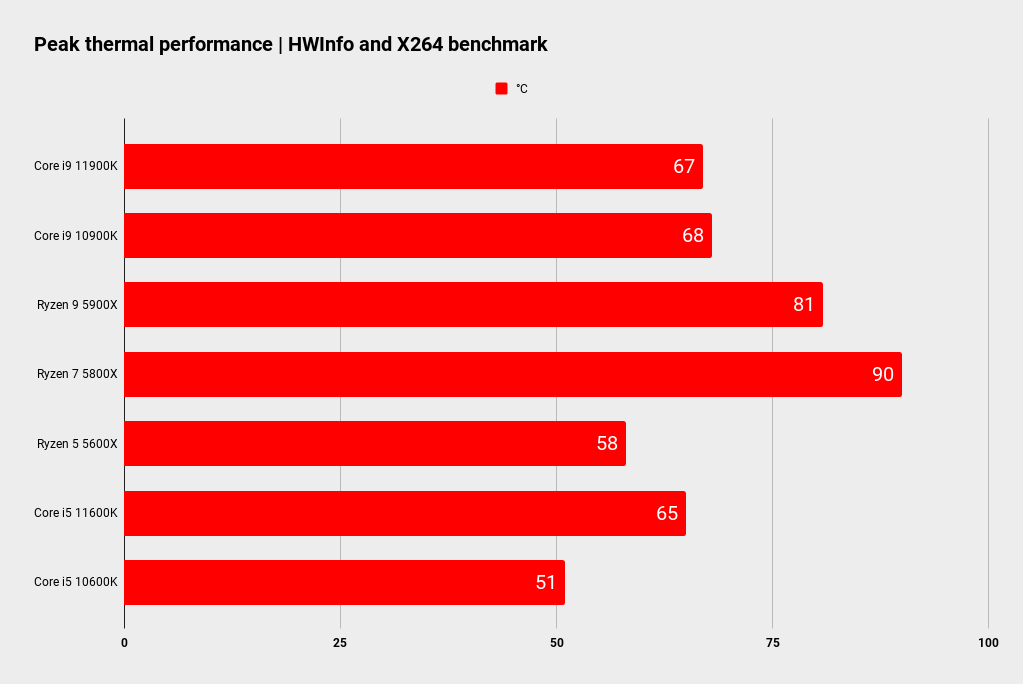
PC Gamer test rig
Intel motherboard: Asus ROG Maximus Cardinal Poor boy
Chipset: Z590
AMD motherboard: Gigabyte X570 Aorus Master
Memory: Corsair Vengeance RGB Pro 32GB @ DDR4-3200
GPU: Nvidia RTX 2080 Ti
Storage: 2TB Kioxia Exceria Plus
Mainframe Cooler: Corsair H100i RGB Pro
PSU: NZXT 850W
Build: DimasTech Miniskirt V2
Monitor: Philips Momentum 558M1RY
And that does mouth off to the bailiwick improvement the Sunny Cove back-port offers. That was something we tested away artificially levelling the performin field and locking both the 10900K and 11900K chips at 5GHz and with eight cores operational.
We only saw an 18 percent IPC increase from a single core Cinebench R20 run. And that utterly does not translate to games, with game performance seeing generally far less than a 6 per centum increase by virtue of the update to Cypress Cove.
Power is the fizzling Edison elephant in the room, however. The Cypress tree Cove back-port, equally I alluded to early, is incredibly athirst when it comes to its power requirements. If you leave the standard power limits in place then the Core i9 11900K runs with 19 percent higher power levels than the 12-core AMD chip, and if you get rid of those power cuffs the delta jumps to 80 per centum higher.
What about overclocking? Yea, that's what I'd like to make love too
And what about the reposition to PCIe 4.0 corroborate? Right instantly, that's a bit of a struggle. Ahead of the release, with the Asus motherboard BIOS Intel supplied for the Maximus XIII Sub, the SSD execution of Gen4 drives seems pretty far off the level set by AMD's Ryzen 5000-series. It's possible that the a posteriori benchmarks we consumption aren't working perfectly with the new Intel platform in the lead of release, merely AS SSD and ATTO are well below where the same Sabrent Projectile 4.0 Plus drive performed on Dot 3.
The PCMark 10 storage tests, however, do show an melioration for Intel, as does the straight 30GB file copy tryout. The game level load time benchmark, using the FFXIV: Shadowbringer test, however, highlights a dip. Which to believe? To follow honest, this seems like the most immature part of the political program, and I feel like the SSD performance lone is expected to change a lot over the next few months.
What about overclocking? Yeah, that's what I'd like to know to a fault. I got nothing out of my sample. Where I could get the Core i9 10900K comfortably running with a 5.3GHz all-core clock speed by undervolting information technology, and even a trifle flakier at 5.4GHz, this Rocket engine Lake chip is having none of it.
Crashes or suddenly aggressive power limits kick in, even when the shackles are supposedly turned. Undervolting doesn't service, and I think this is something I'm going to hold to revisit a few BIOS updates down the line.
Depth psychology
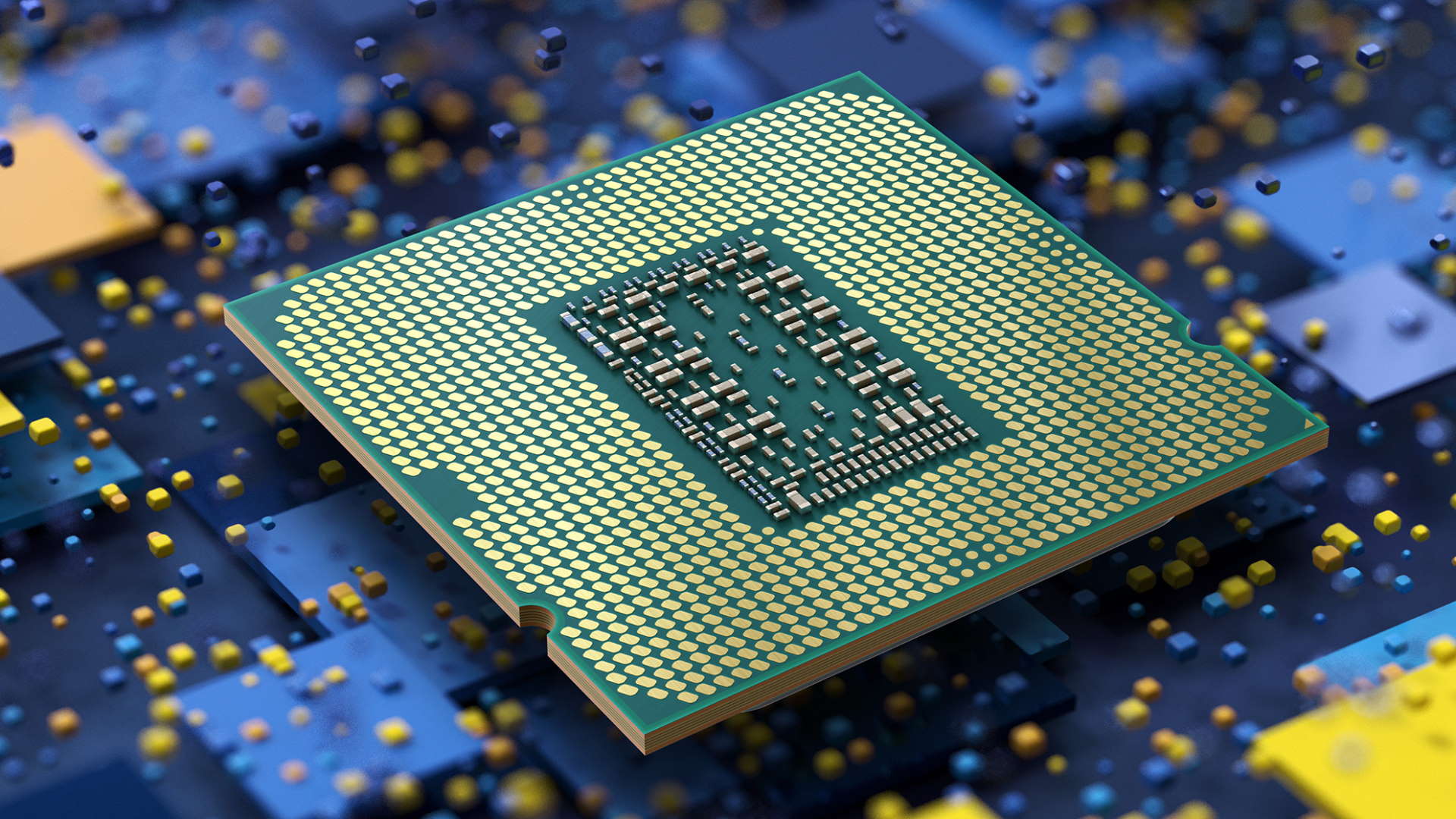
What does the Intel Core i9 11900K mean for PC gaming?
The Core i9 11900K seems to exist solely thusly Intel can tell people it has the world's quickest gaming processor over again. Our execution metrics coiffure bear that call out, but the numbers are only but in Intel's favour compared to our front-runner AMD chip, the Ryzen 9 5900X. That agency game performance privy't really be a shaping factor when the time comes to choose your next Processor.
That only really works if everything other is isothermal, and that's not the case with this generation. Certainly, it's tough for me to advocate the Core i9 11900K purely on the back of its slight gaming performance jumper cable considering the breadth of platform that AMD presently offers.
The only struggle for the red team, and the one place where Intel might be able to garner a trifle positivity around Roquette Lake, is in the fact that the Ryzen 9 5900X has been in mighty limited supply for much of its life. Everything in PC gaming has been in short supply it seems, though in processor terms things have been nowhere as glutinous as in the graphics card market, and there are definite signs of a recovery for the other Zen 3 CPU stocks.
The right mainstream whammy-nitty-gritty Ryzen 5 5600X is back on sale over again at $350 and the eight-core Ryzen 7 5800X is available too at $490. If the 12-core, $550 Ryzen 9 5900X was on hand information technology would 100 percent constitute the C.P.U. to beat, something the Core i9 11900K only does by a tomentum in gambling.
But IT's not available, and so what about compared to the octet-heart and soul Ryzen 7 5800X? That's got a alike level of undiversified processing performance, if non a touch more, and is roughly connected par when information technology comes to gaming too, if not a slim lower. Information technology is much cheaper though, comes with full PCIe 4.0 support crossways the entire platform of CPU and chipset, and isn't going to be quite a so stringent of your PSU for full-fat performance.
And then, that still feels like a more reasonable chip to chase than the newly discharged Rocket Lake processors.
What if you need a little more at the high-end though? What if you thirst the promise the spare core calculate of the Ryzen 9 5900X offered, but can't go clear up to the now ludicrously expensive Ryzen 9 5950X? This is where Intel has a shot, and in separate that's thanks to Arugula Lake.
Because the late Intel 11th Gen chips have been recently minted the older 10th Gen CPUs, which are still in pretty healthy stock thanks to a genuine AMD alternative evening out demand, are available for a great monetary value now. The Core i9 10900F, a 10-core, 20-thread chip with a treble time speed, is the same $350 as the six-core, 12-thread Ryzen 5 5600X.
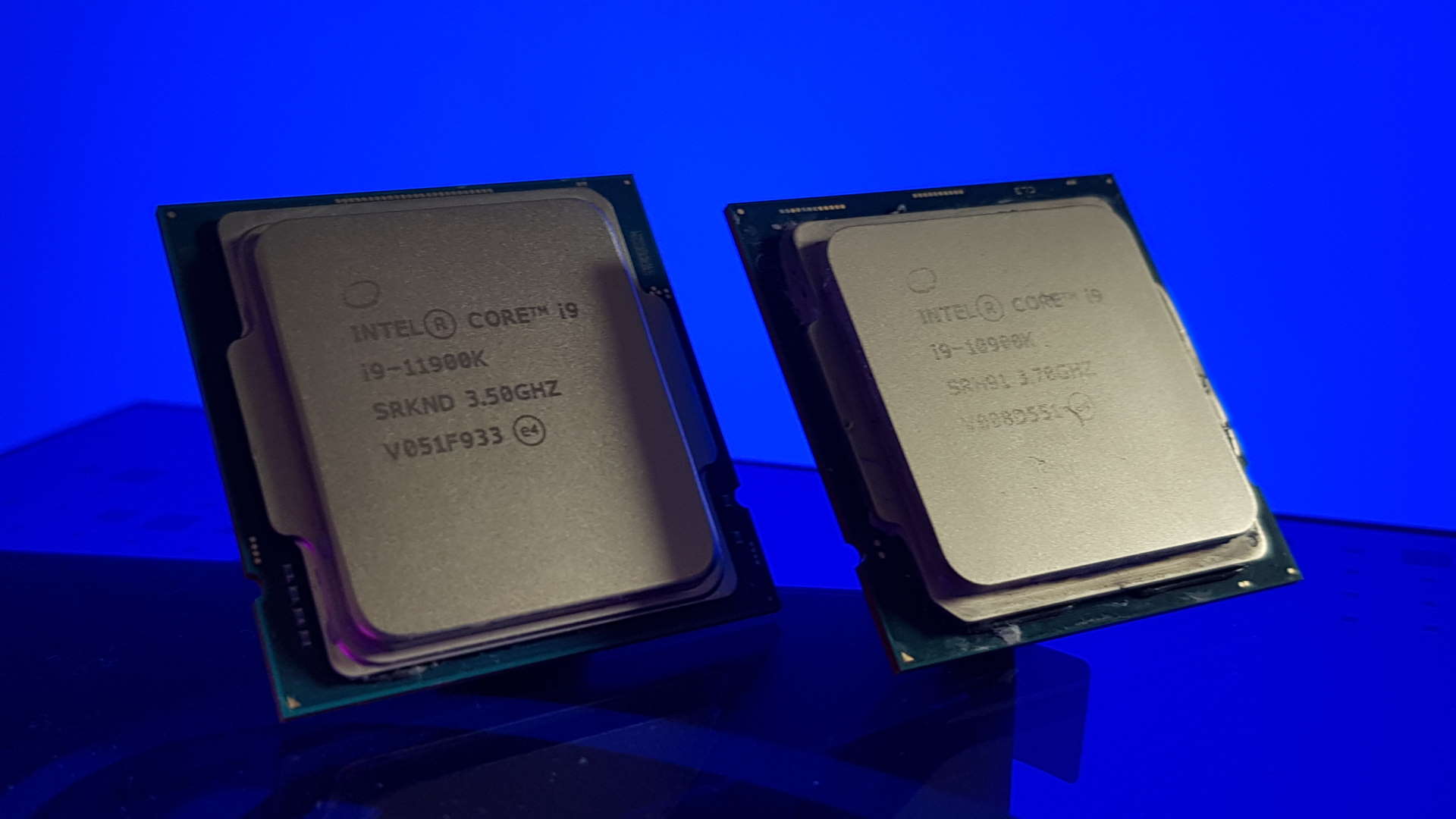
It still feels like there's no place for Roquette Lake at the overlooking last, though. Honestly, it's a groovy thing the company regular its big Intel Unleashed event ahead the release of these 11th Gen background chips because based on the Core i9 11900K you'd be forgiven for looking at Intel as though it had completely preoccupied its fashio. I'd certainly have less hope information technology could find a track back without Pat Gelsinger's confident keynote the other day.
Rocket Lake brings zero new to the table for all its with-it retrograde engineering
Back-porting its 10nm architecture to fit with its age 14nm manufacturing prowess probably seemed like a smart gyre of the dice when information technology was first mooted, but the reality of that decision has disclosed a flagship CPU that offers a solution to a trouble that doesn't exist for anyone but Intel. It's Intel that needful a cow dung to catch or beat AMD's rejuvenated Back breaker 3 gaming metrics, non us.
Comet Lake trades blows with AMD, and we've spoken about how little impact the CPU has along frame rates in real terms. So either of the 10th Gen or 5000-series chips will deliver on those counts. So Rocket engine Lake brings nothing new to the table for all its smart regress engineering.
Apart from, that is, lower down the stack. Back in the before time, the long, long ago, when Intel was dominant, we would laud the power of the Core i7 (then the top of the line) but recommend the Essence i5 every bit the peerless most gamers should go for. Now the Core i5 is the only Rocket Lake anyone should go for.
That's a scrap which improves on its forebear on all level, comes in at the ethical price, and generally superior its AMD hex-core equivalent into the bargain.
The part I still put on't really understand is why Tiger Lake itself wasn't an option. Was it simply set to the intensity of high-public presentation 10nm chips that IT would need to produce in order to fulfill both the demands of gaming laptop and desktop users? Could Intel not trust its 10nm fabs to deliver all it requisite? Or was there some taxon reason it had to get a new chip generation out at the take up of year?
I guess the noesis that Alder Lake was en route at the end of 2021 meant any other release timing would bump too close into that launch, then if Intel could bank on delivering the 10nm Tiger Lake architecture to desktops, only not until the Summer, maybe that's why IT was off the cards. It's certainly non because the atomic number 14 can't hit the time speeds desktop users demand, as the promised Tiger Lake H CPUs are set to drop into laptop farming with leading to eight cores, 16 threads and 5GHz+ frequencies.
Those sound like bad good numbers for an 11th Gen screen background chip if you ask me, and would offer an IPC bump flush o'er Cypress Cove, would sit in a smaller parcel, and glucinium right more power-efficient than Rocket Lake is capable of.
For Maine, taking the backwards step of releasing a Core i9 with fewer cores than the last generation, merely for a higher price, exemplifies that traditional Intel hubris, making it seem Eastern Samoa though the company has learned nothing from the relentless rise of Ryzen. If Intel had swallowed its pridefulness, eschewed the i9 tier just for Rocket Lake, and simply ready-made this its $399 octa-core i7, it would have been a far more welcome addition to the market.
Instead, it's saddled the i9 with an reasonless monetary value tag and hobbled the i7.
Verdict
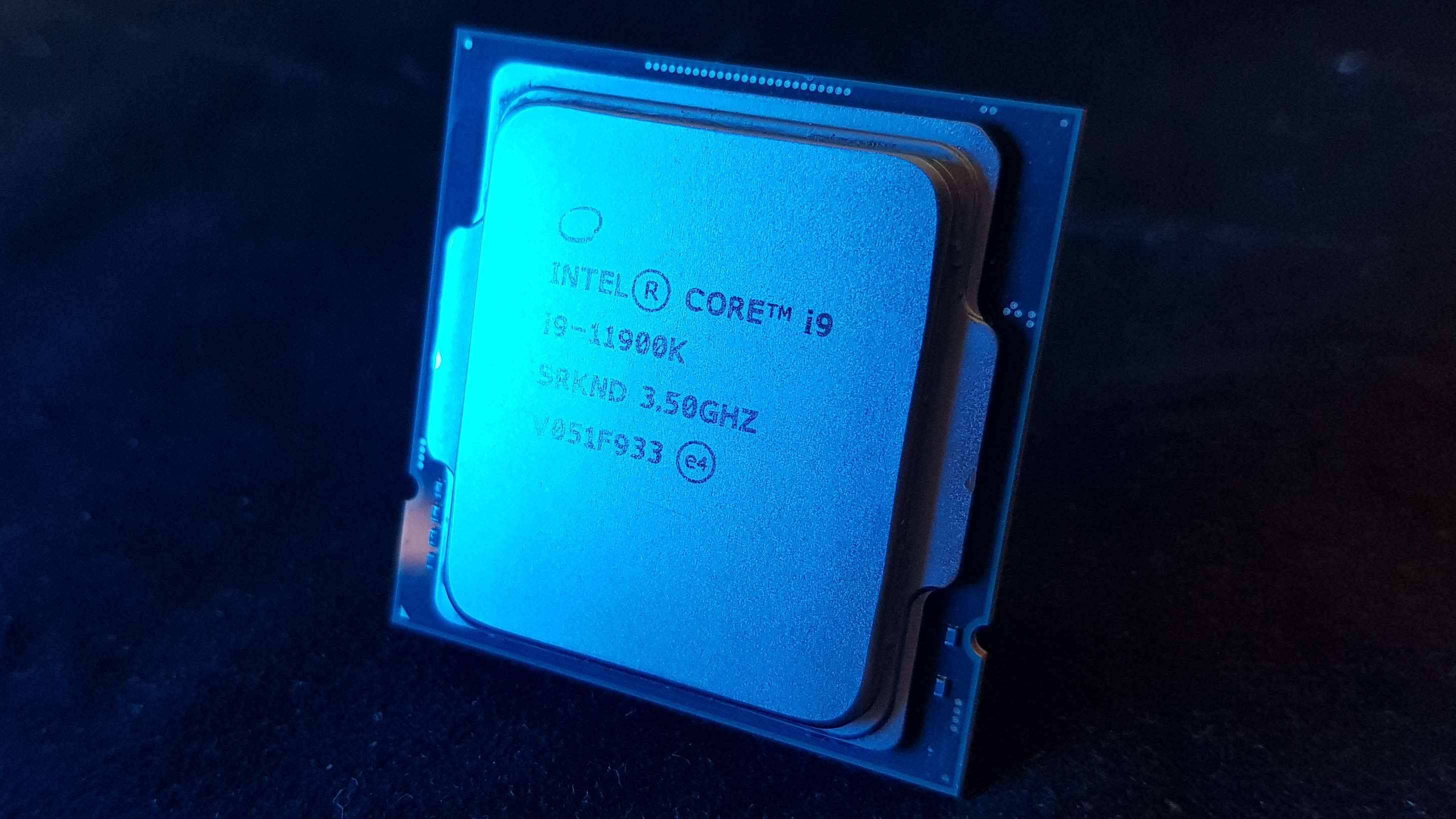
Should you buy the Intel Core i9 11900K?
The Core i9 11900K Eastern Samoa the world's fastest gaming processor is a fine entitle to present to your investors, and maybe even help to temporarily add a couple of points to your merchant ship line, but for us PC gamers it's become an almost irrelevant exact. With your GPU having so much many impact on gaming frame rates than your CPU, these years having the earthly concern's fastest gaming processor feels a little like being able to order you've got the lightest SSD or the most waterproof graphics notice in your desktop rig.
In the end, for gaming, your CPU truly just needs to be good sufficient to allow your graphics bill to flex, and that agency your decision comes down to what else a knap can offer. And in those terms, AMD's Ryzen 5000-series processors have far more in their lockers.
The Core i9 11900K lone has a few figure rate wins to show for itself. Information technology's not tangibly quicker than the last-gen i9—in fact, it's notably slower in multithreaded processing power—has a weaker glasses weather sheet, costs more, and is far more thirsty. And Comet Lake itself was already pretty demanding on it advanced.
As the for the first time PCIe 4.0 compatible Intel weapons platform, IT's also a disappointment as it can only offer stomach from the CPU itself, not the chipset. And flatbottom then the performance looks beautiful uncheerful right now.
On the AMD side, however, you have options for greater core counts, effectively the equal level of gaming performance (what's a few FPS between friends?), a Sir Thomas More mature PCIe 4.0 enabled political program, and more affordable eight-core chips to offer. And when the Ryzen 9 5900X comes back into livestock, AMD has the high-grade all-assaul CPU offering there is.
The answer and so is: No. You shouldn't buy a Core i9 11900K, because there are objectively better chips on pass from AMD operating room even Intel's past generation.
Intel Core i9 11900K
A startlingly surplus CPU, one that only serves Intel's own designs and non actual PC gamers. Its specs feel weaker than the endmost-gen flagship, IT's more expensive, and has a thirstier core group at its 14nm heart.
Source: https://www.pcgamer.com/intel-core-i9-11900k-review-benchmarks-performance/
Posted by: salgadohawas1970.blogspot.com



0 Response to "Intel Core i9 11900K review | PC Gamer - salgadohawas1970"
Post a Comment